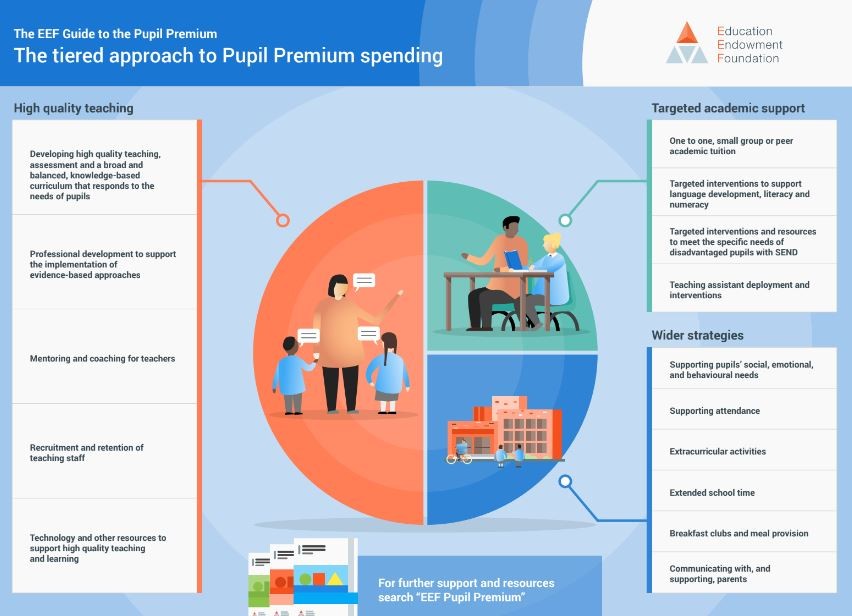Some children are entitled to the Pupil Premium Grant (PPG). The pupil premium grant is funding to improve educational outcomes for disadvantaged pupils in state-funded schools in England. The grant also provides support for children and young people with parents in the regular armed forces, referred to as service pupil premium (SPP).
Pupil premium is not a personal budget for individual pupils, and schools do not have to spend pupil premium so that it solely benefits pupils who meet the funding criteria.
Each year the school publishes how it intends to spend the money that it receives through our Pupil Premium Strategy. This detials our identified challenges, our 3 year intended outcomes and our planned activity for the current academic year. In order to support us in using our funding effectively we use the wealth of evidence of ‘what works’, evaluated by the Education Endowment Foundation (EEF).
At Russell Lower School we have been very successful in supporting children in receipt of the PPG to achieve well in all areas od the curriculum. If you think your child may be eligible for the PPG, please contact the school office (office@russell-lower.co.uk or 01525 755664) for more information.
Statement of intent
At Russell Lower School as of 2021-2022 we have adopted the RADY (raising the attainment of disadvantaged youngsters) approach. It is our intent to:
- raise expectations;
- raise awareness;
- raise aspirations;
in order to close gaps between our disadvantaged pupils and their non-disadvantaged peers both in terms of attainment and holistic opportunities and experiences through focusing on equity not equality.
RADY Pledge
Our school pledges to take the following steps as part of the implementation of RADY to provide an equitable approach, resulting in improved outcomes for disadvantaged youngsters:
- An uplift will be applied for all disadvantaged youngsters at the start of the phase of education so that, if all children reach their increased target, attainment will be equalised by the end of the phase of education, and we can diagnose and address gaps in knowledge, skills and understanding at the earliest opportunity
- RADY will form the Golden Thread through the existing school development plan, resulting in all leaders driving RADY through their respective areas which will help to ensure that RADY becomes a sustainable approach that is embedded into the school culture
- We will work to achieve proportional representation for disadvantaged youngsters in all aspects of school life by the end of the first year of implementation so that our disadvantaged youngsters are challenged in lessons and engaging in wider experiences outside of the classroom that will develop their skills to be successful in life
- From the end of 2021-2022 all colleagues within the school will understand what RADY is and be able to articulate what we are doing as a school to increase the attainment of our disadvantaged youngsters.
Research states that disadvantaged pupils have been disproportionately affected by the pandemic. In order to address this our strategy is integral to wider school plans and our SDP ‘golden threads’ for whole school improvement. We understand that by developing evidence-based practices (which we have been focussing on for several years now) that support our disadvantaged pupils we will also be enhancing staff skills and provisions for all pupils.
At Russell Lower high-quality teaching is at the heart of everything we do, with a focus on areas in which disadvantaged pupils require the most support. This is proven to have the greatest impact on closing the disadvantage attainment gap and at the same time will benefit the non-disadvantaged pupils in our school.
We also continue to make use of targeted support for those who are not making good progress, or those who have been disproportionately impacted by the effects of the pandemic. We consider carefully the links between structured small group interventions to classroom teaching and the curriculum and use high quality evidence based provisions to support our pupils.
We are constantly mindful of the wider strategies we use and ensure they relate to the most significant non-academic challenges to success in school, including attendance, behaviour, and social and emotional support, which also may negatively impact upon academic attainment.
We believe accurate early identification of need and knowing our pupils well is key in supporting our disadvantaged pupils to make good progress and achieve high attainment in all subject areas. For this reason, teachers carry out PP passports within the first two weeks of pupils returning to school and appropriate support/provisions are identified and set up by the end of the third week back in September.
We also believe engagement of our PP/vulnerable families is key and continue to develop our communication with these families whilst being mindful to protect these families from any kind of stigmatisation or stereotyping. We invite them to contribute (via Your thoughts questionnaire) to influence the provision their children receive so that it has the greatest impact on raising attainment.
Through robust diagnostic assessment carried out by Phase Leaders, the Inclusion Lead, the Deputy Head (PP Lead) and the Headteacher supported by LSAs and class teachers during half termly PP meetings/Pupil Progress Meetings (PPMs) we are able to ensure our approach to supporting our disadvantaged pupils is responsive to common challenges and individual needs.
We worked with Challenging Education (Louise Blackburn) during 2021/22 and 2022/23 to implement RADY approaches. We will be continuing with this into future years.
If you would like to discuss Pupil Premium more please contact your child's class teacher in the first instance.

